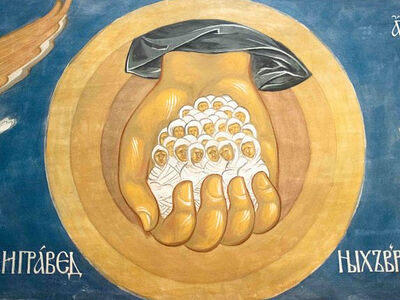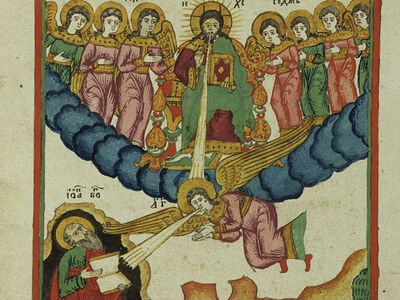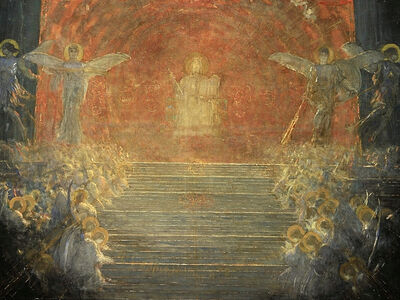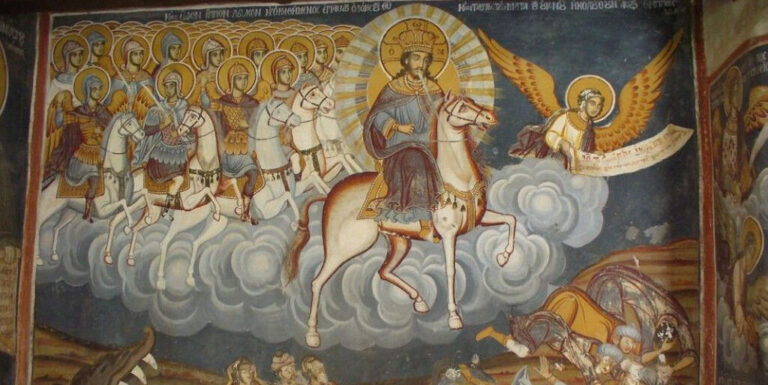Revelation: Removing the VeilThis revelation was given by God to the Apostle John because we needed to know it.
Part 1

If Christ Is With Us, Death Is DefeatedThe book of Revelation teaches us a lot, especially when we begin to carefully delve into its words, when we see how Christ holds the world in His hands and acts with wisdom in all things.
Part 2

Why Did the Lord Leave Man the Book of Revelation?Only the people of God, the saints, can receive revelations from God, and only they can interpret them, because a revelation, words from God, is given from God, from the Holy Spirit.
Part 3

For the Time Is at Hand…We have to understand that God acts outside of time, and the events of Revelation don’t relate only to the end times.
Part 4

Blessed Is He That Readeth…Christ sent the revelation through an angel to His servant the Apostle and Evangelist John, who conveyed the word of God and the testimony of Jesus Christ about what he saw and heard.
Part 5

He Hath Made Us Kings and PriestsA man who is close to God, my dears, truly feels like a king—he has no need of anything. At the same time, he may have absolutely nothing.
Part 6

John, Our Companion in Tribulation, and in the Kingdom and Patience of Jesus ChristOne of the most significant and frequent references to the Holy Trinity is in the text of Revelation.
Part 7

Because Thou Hast Left Thy First Love…The greatest miracle is that the Church exists.
Part 8

Fear None of Those Things Which Thou Shalt SufferThus, God says the following: He is the First and the Last, the Beginning and the End. Nothing exists outside of Him; in Him is everything. He is the Beginning and End of all things.
Part 9

Holding Fast to the Name of ChristTo hold fast the name of God is a blessing; it’s martyrdom, and it’s a confession.
Part 10

Sin Is Marriage with SatanSin will never lead us to good; it brings only evil, torment, and suffering. It’s the consequence of our deeds, not the punishment of God.
Part 11

Remember Where You Fell FromWe have to examine ourselves, whether we’re alive or not. And how can we know that someone has died?
Part 12
Trust in God’s providence
The book of Revelation wasn’t written to satisfy our curiosity about coming events; not so we’d know whether Cyprus will be liberated, what will become of the Turks, what will happen to the rest of us. The book of Revelation was written to help us trust in Christ, to hope in Christ, and to know that Christ will prevail in the end, and that we’ll all inherit the Kingdom of God—that our goal is the Kingdom of God. But on the way there, we will undoubtedly encounter everything that Revelation gradually reveals through various images. Reading it, it’s not easy to understand what’s already happened, what will happen, and what is happening right now.

Christ on a white horse, Philotheou Monastery, Mt. Athos
We’re reading the third chapter, verse 7. Christ sends seven epistles to seven Churches through the Apostle John. We’ve already read five; there are two left.
Thy will be done
Christ tells St. John the Theologian: And to the angel of the Church in Philadelphia write; These things saith He that is holy, He that is true, He that hath the key of David, He that openeth, and no man shutteth; and shutteth, and no man openeth (Rev. 3:7). Here He addresses the bishop of the Church of Philadelphia. In these lines, Christ speaks of Himself, using epithets found in the Old Testament when it speaks about God. In the Old Testament, God is called holy, true, and “Amen.” This is another of the many proofs in Sacred Scripture that Christ is the true God Who spoke with the prophets in the Old Testament.
Only God is holy. We’re not holy—we become partakers of the holiness of God, each in proportion to his labors, to his purification from passions and sins. But only God can be called holy and true according to essence. Here it says that He Who is holy and true has the keys of David. May no one think that God has the keys to open and close certain doors. Here we’re talking about the power of the Holy Spirit, the power of the Divine Hypostasis. When God opens something, no one can close it. And when God closes something, no one can open it. This is very important for all of us to keep in mind.
We encounter such phenomena quite often: We try to do something, but it doesn’t work out.
Sometimes, unexpected circumstances lead us down a path we never anticipated, a path that opens up without us even asking for it. This can be seen as a manifestation of God’s will, which we all seek in our lives. We constantly pray for God’s will to be done, as it ultimately leads to our salvation. Despite our past mistakes and sins, God never abandons us. Even when we push Him away, He remains with us, guiding us towards the truth and our salvation. In moments of doubt and struggle, we must remember that God is always with us, providing us with the strength and courage we need to overcome obstacles. Trusting in God’s infinite power and mercy, we can be assured that every challenge we face is ultimately for our own good. God’s plans are unshakeable, and His guidance is unwavering, leading us towards our ultimate salvation. Our Elder also emphasized: “If a door doesn’t open when you knock, don’t force it open.” Consider that perhaps it is in your best interest if God does not open that door. You have prayed, tried, and done everything you can, but things are not going your way. Your efforts remain unresolved. Take a moment to reflect: “If I seek God’s will and ask for His help, why is everything closed off? Maybe this is happening for a reason; perhaps this is how it should be.” Often, this is the case. Our ancestors believed that every obstacle serves a purpose.
Sometimes, obstacles prevent us from moving forward. Things may not go as planned, but in hindsight, we may realize that it was for the best. When we trust in God and seek His guidance, we must also have faith in His timing. We can do our part, but ultimately, it is up to God to open or close doors for us.
In Revelation 3:8, the Lord assures us that He knows our deeds and has set an open door before us that no one can shut. He acknowledges our efforts and promises that no obstacle can stand in our way if we remain faithful to His word. It is crucial for us to stay committed to God and use whatever strength we have for His glory.
The saints teach us that even if we feel weak or incapable, offering our intentions to God can bring us strength and empowerment. By expressing our desire to do His will, God can work through us to achieve great things. It is essential to remain faithful to God and not turn away from His teachings, even in the face of temptation or difficulty.
Renouncing the name of God is not just about denying His existence; it can also occur when we justify sinful behavior or refuse to acknowledge our mistakes. True repentance requires humility and a willingness to admit when we have gone astray. Justifying our actions only hinders our ability to seek forgiveness and receive God’s grace. Pride prevents us from recognizing our faults and seeking reconciliation with God. “I am a man of weakness and passion.”
There are two types of worship discussed in the text. The first type is the worship given to God, serving Him as the true God. The second type is the veneration of icons or saints as a sign of respect. This type of worship is relative, expressing respect without idolizing the icons.
The concept of temptation is also explored, highlighting that it includes not only inclinations towards sin but also various difficult moments in life. The text emphasizes the importance of enduring trials and hardships with patience, as they are opportunities for growth and manifestation of love.
The example of the Apostle Paul and other saints enduring severe trials is used to illustrate how challenges can lead to spiritual purification and the manifestation of love’s power. Despite the hardships faced by these individuals, it is through their endurance that they are able to demonstrate the strength of their faith and love for God. Isn’t that sufficient? Why did this have to occur as well?”
However, God does not focus on the temporary and fleeting aspects of life. He looks at mankind and sees that we are not made for just this life. This earthly life will pass quickly, with a maximum lifespan of 100-120 years before we depart. God is preparing His children, much like a teacher prepares students for exams and college. He wants His children to pass their tests and enter into His eternal Kingdom. Therefore, it is important for us to have patience, remain steadfast in the word of God, trust Him, and not be afraid of anything that may happen, even catastrophic events that may cause chaos and destruction. We should not lose hope in God or think that He has abandoned us.
The Lord has promised to protect His followers from the trials that will come to test all who live on earth.
After the book of Revelation was written, the Church faced great trials such as the persecutions of Domitian, Nero, and others. This persecution affected Christians all over the world, leading to the deaths of 11 million martyrs. The Church endured serious difficulties for 400 years, with many Christians hiding in catacombs to escape persecution. This cycle of persecution has continued throughout history. Persecution is not just about physical harm, but also includes various forms of suffering. The Lord has promised to deliver His followers from these trials.
To be continued…
(Note: This content is suitable for integration into a WordPress platform with the original HTML tags, images, and key points preserved.)
Source link

